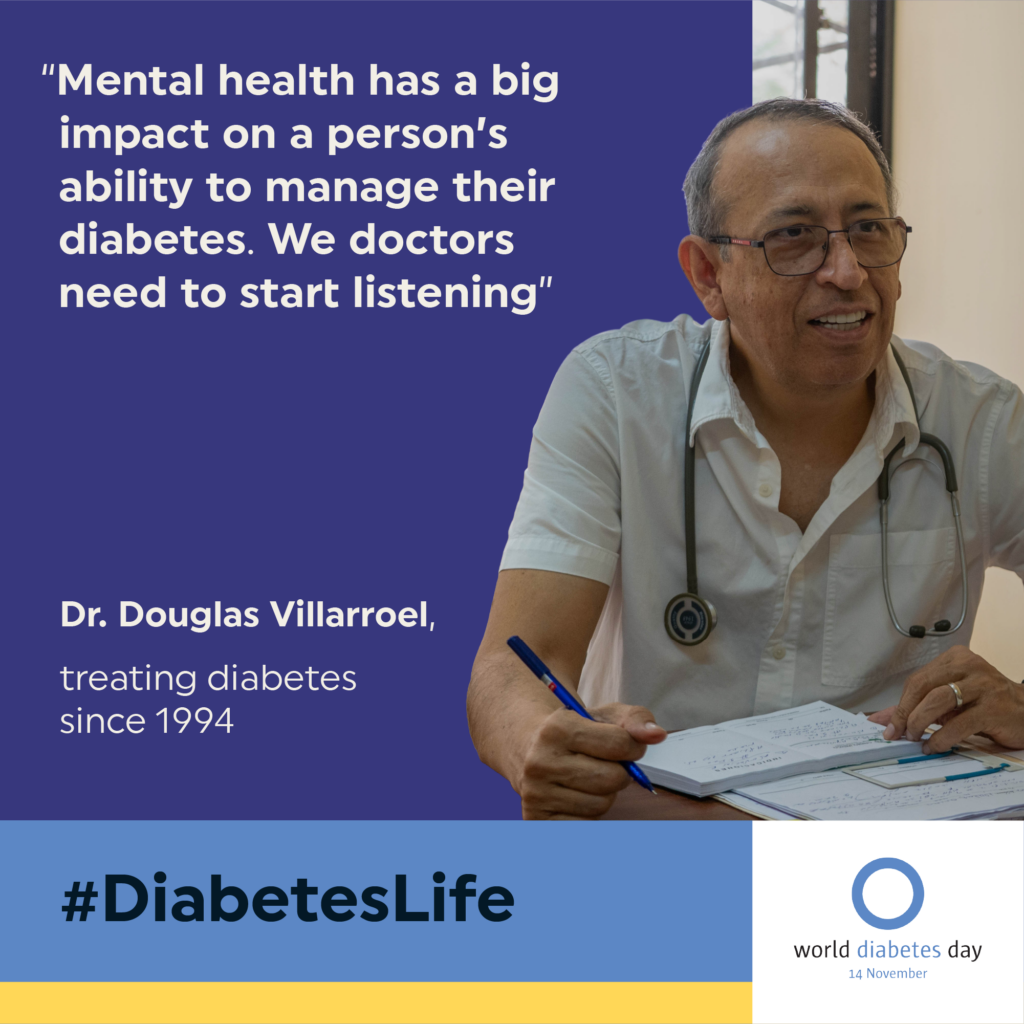
For hundreds of millions worldwide, diabetes is not just a physical condition, it’s an around-the-clock emotional challenge. Hearing from advocates around the world ahead of World Diabetes Day, it’s clear this burden is shared across the entire diabetes community. Our advocate from Zimbabwe described the constant vigilance and decision-making required to manage his condition, while in Spain they reflected on the unchosen limitations diabetes places on daily life. In India, another advocate highlighted the intense mental strain of balancing work, rest and nutrition. These experiences reveal how daily diabetes management imposes a hidden burden on mental well-being, which is largely unseen by society and unaddressed by healthcare systems.
Our newest global survey revealed that 3 in 4 people with diabetes have experienced mental health conditions such as anxiety and depression, as a direct result of their condition.1 Yet, in the main, diabetes care focuses on blood sugar levels and treating complications once they are present, leaving the mental and emotional needs of people with the condition unmet. To create a better life for people with diabetes, we must look beyond blood sugar and make well-being central to diabetes care.
The disconnect between physical and mental aspects of diabetes care has significant consequences. Nearly 80% of people living with diabetes report experiencing diabetes burnout, a state of physical or emotional exhaustion caused by the daily requirements of managing diabetes.1 Many find themselves interrupting or stopping treatment due to the emotional toll of the condition. This disruption in care can be extremely dangerous, raising the risk of complications and harming long-term health outcomes
However, we now have an opportunity to change this on a global scale. The World Health Organization’s Global Diabetes Compact, a global initiative to improve diabetes care and reduce the disease’s burden through enhanced health systems, universal care, and risk factor reduction, offers a framework to ensure mental well-being becomes a priority. This international commitment aims not only to improve diabetes outcomes but to prioritize the mental and emotional well-being of people with diabetes as an integral part of healthcare systems.
If we want diabetes care to be truly effective, we must treat the whole person, not just the condition; the key to that transformation lies with healthcare providers. In fact, 75% of people with diabetes express a need for more mental health support from their healthcare providers. Improving diabetes care doesn’t necessarily mean overhauling existing practices.1 Often, it can begin with a single question: “How are you feeling?”. By incorporating this simple check-in during routine appointments, providers create space for their patients to discuss the emotional aspects of managing diabetes. This isn’t about providers solving every mental health concern; it’s about showing compassion and recognizing that mental well-being is fundamental to effective diabetes care.
By routinely asking about mental and physical well-being, providers signal that they see their patient as a whole person, not just a set of symptoms. This approach can uncover hidden struggles, such as burnout or anxiety, that may interfere with a person’s ability to manage their diabetes. These brief but meaningful interactions allow providers to guide people with diabetes toward needed support, whether that’s a counselling referral, peer support groups, or stress management resources. These immediate actions are critical to setting the stage for broader policy changes.
The Global Diabetes Compact provides a roadmap to equitable access to quality treatment and care to support the well-being of people with diabetes. The International Diabetes Federation urges healthcare leaders and policymakers around the world to accelerate efforts toward these goals by prioritizing universal health coverage, strengthening primary care systems, and addressing risk factors. Achieving these goals is essential not only for better diabetes management but also for improving quality of life and emotional resilience.
Addressing the mental health needs of people living with diabetes begins with a willingness to ask, to listen, and to recognize the human being behind the condition. By integrating mental health support into routine diabetes care, healthcare providers can make a profound difference, aligning their approach with the broader vision laid out in the Global Diabetes Compact.
This World Diabetes Day let’s reimagine diabetes care to treat people with diabetes in their entirety. We must look beyond blood sugar to alleviate the hidden burden of diabetes and achieve a better quality of life for the millions worldwide managing this complex condition.
Visit www.worlddiabetesday.org to learn more about and support our campaign to put well-being at the heart of diabetes care.
Reference
- International Diabetes Federation. Diabetes’ hidden burden: Research reveals that diabetes impacts the mental well-being of 3 in 4 people living with the condition. 2024. [Press release]. Available at: https://idf.org/news/diabetes-hidden-burden (accessed 13 November 2024)
Disclosures: This article was provided to touchENDOCRINOLOGY by the International Diabetes Federation (IDF). No fees or funding were associated with this short publication. Image: © 2024. IDF.


